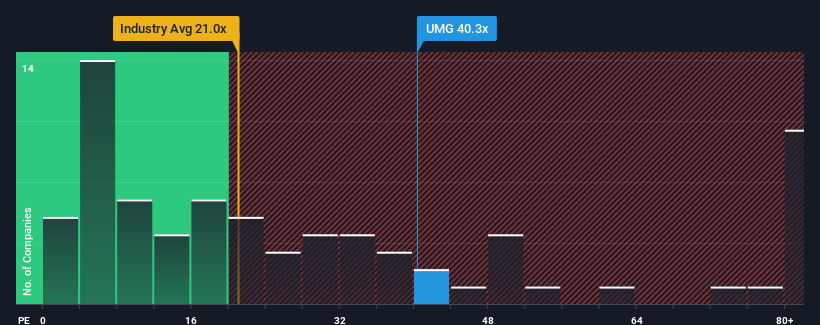- Netherlands
- /
- Entertainment
- /
- ENXTAM:UMG
Unpleasant Surprises Could Be In Store For Universal Music Group N.V.'s (AMS:UMG) Shares

When close to half the companies in the Netherlands have price-to-earnings ratios (or "P/E's") below 16x, you may consider Universal Music Group N.V. (AMS:UMG) as a stock to avoid entirely with its 40.3x P/E ratio. Although, it's not wise to just take the P/E at face value as there may be an explanation why it's so lofty.
Universal Music Group certainly has been doing a good job lately as its earnings growth has been positive while most other companies have been seeing their earnings go backwards. It seems that many are expecting the company to continue defying the broader market adversity, which has increased investors’ willingness to pay up for the stock. If not, then existing shareholders might be a little nervous about the viability of the share price.
View our latest analysis for Universal Music Group

What Are Growth Metrics Telling Us About The High P/E?
Universal Music Group's P/E ratio would be typical for a company that's expected to deliver very strong growth, and importantly, perform much better than the market.
Retrospectively, the last year delivered an exceptional 60% gain to the company's bottom line. However, this wasn't enough as the latest three year period has seen a very unpleasant 8.3% drop in EPS in aggregate. Therefore, it's fair to say the earnings growth recently has been undesirable for the company.
Shifting to the future, estimates from the analysts covering the company suggest earnings should grow by 17% each year over the next three years. That's shaping up to be similar to the 16% per year growth forecast for the broader market.
In light of this, it's curious that Universal Music Group's P/E sits above the majority of other companies. It seems most investors are ignoring the fairly average growth expectations and are willing to pay up for exposure to the stock. Although, additional gains will be difficult to achieve as this level of earnings growth is likely to weigh down the share price eventually.
The Bottom Line On Universal Music Group's P/E
While the price-to-earnings ratio shouldn't be the defining factor in whether you buy a stock or not, it's quite a capable barometer of earnings expectations.
We've established that Universal Music Group currently trades on a higher than expected P/E since its forecast growth is only in line with the wider market. Right now we are uncomfortable with the relatively high share price as the predicted future earnings aren't likely to support such positive sentiment for long. Unless these conditions improve, it's challenging to accept these prices as being reasonable.
Plus, you should also learn about this 1 warning sign we've spotted with Universal Music Group.
If P/E ratios interest you, you may wish to see this free collection of other companies with strong earnings growth and low P/E ratios.
New: AI Stock Screener & Alerts
Our new AI Stock Screener scans the market every day to uncover opportunities.
• Dividend Powerhouses (3%+ Yield)
• Undervalued Small Caps with Insider Buying
• High growth Tech and AI Companies
Or build your own from over 50 metrics.
Have feedback on this article? Concerned about the content? Get in touch with us directly. Alternatively, email editorial-team (at) simplywallst.com.
This article by Simply Wall St is general in nature. We provide commentary based on historical data and analyst forecasts only using an unbiased methodology and our articles are not intended to be financial advice. It does not constitute a recommendation to buy or sell any stock, and does not take account of your objectives, or your financial situation. We aim to bring you long-term focused analysis driven by fundamental data. Note that our analysis may not factor in the latest price-sensitive company announcements or qualitative material. Simply Wall St has no position in any stocks mentioned.
About ENXTAM:UMG
Outstanding track record with limited growth.
Similar Companies
Market Insights
Community Narratives




